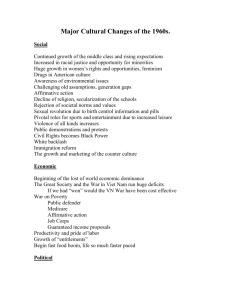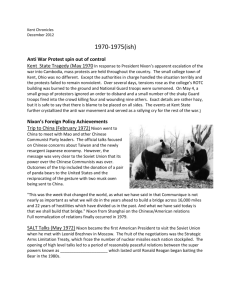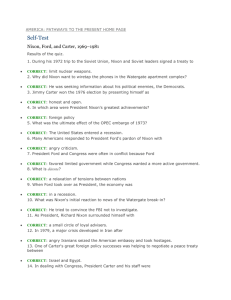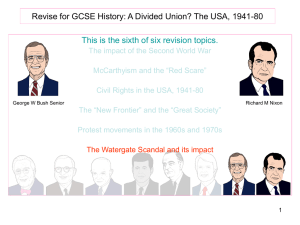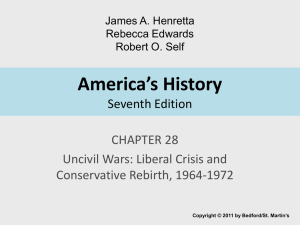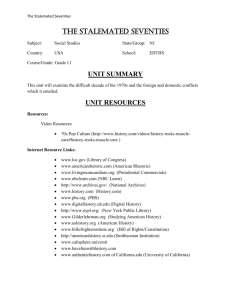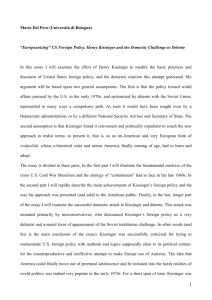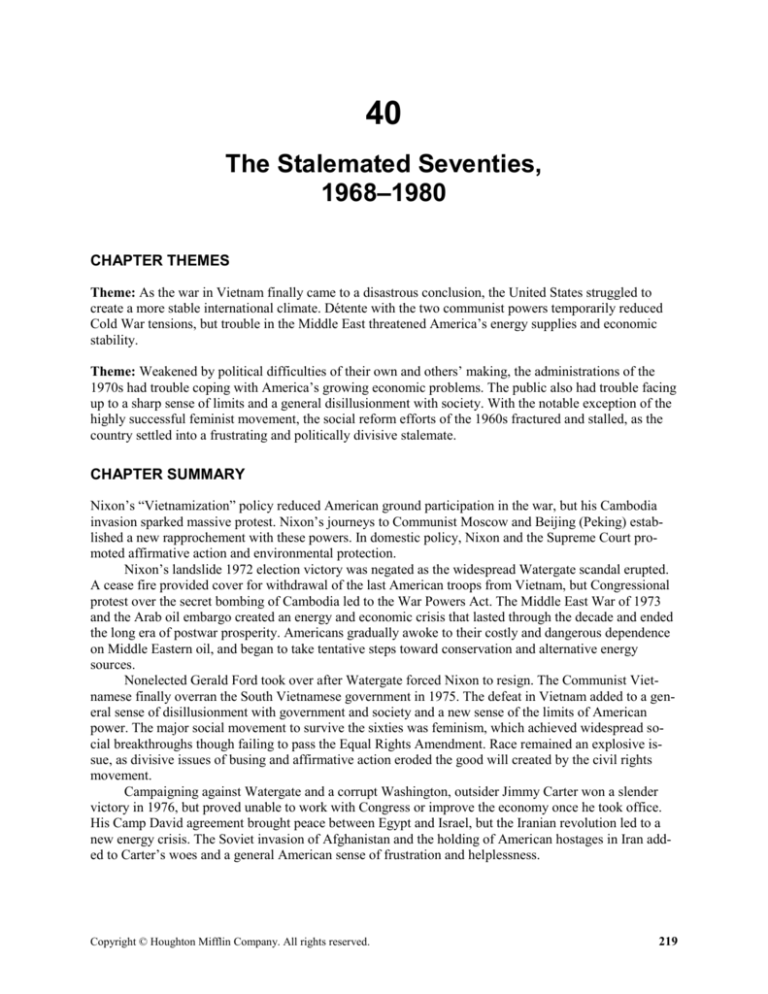
40
The Stalemated Seventies,
1968–1980
CHAPTER THEMES
Theme: As the war in Vietnam finally came to a disastrous conclusion, the United States struggled to
create a more stable international climate. Détente with the two communist powers temporarily reduced
Cold War tensions, but trouble in the Middle East threatened America’s energy supplies and economic
stability.
Theme: Weakened by political difficulties of their own and others’ making, the administrations of the
1970s had trouble coping with America’s growing economic problems. The public also had trouble facing
up to a sharp sense of limits and a general disillusionment with society. With the notable exception of the
highly successful feminist movement, the social reform efforts of the 1960s fractured and stalled, as the
country settled into a frustrating and politically divisive stalemate.
CHAPTER SUMMARY
Nixon’s “Vietnamization” policy reduced American ground participation in the war, but his Cambodia
invasion sparked massive protest. Nixon’s journeys to Communist Moscow and Beijing (Peking) established a new rapprochement with these powers. In domestic policy, Nixon and the Supreme Court promoted affirmative action and environmental protection.
Nixon’s landslide 1972 election victory was negated as the widespread Watergate scandal erupted.
A cease fire provided cover for withdrawal of the last American troops from Vietnam, but Congressional
protest over the secret bombing of Cambodia led to the War Powers Act. The Middle East War of 1973
and the Arab oil embargo created an energy and economic crisis that lasted through the decade and ended
the long era of postwar prosperity. Americans gradually awoke to their costly and dangerous dependence
on Middle Eastern oil, and began to take tentative steps toward conservation and alternative energy
sources.
Nonelected Gerald Ford took over after Watergate forced Nixon to resign. The Communist Vietnamese finally overran the South Vietnamese government in 1975. The defeat in Vietnam added to a general sense of disillusionment with government and society and a new sense of the limits of American
power. The major social movement to survive the sixties was feminism, which achieved widespread social breakthroughs though failing to pass the Equal Rights Amendment. Race remained an explosive issue, as divisive issues of busing and affirmative action eroded the good will created by the civil rights
movement.
Campaigning against Watergate and a corrupt Washington, outsider Jimmy Carter won a slender
victory in 1976, but proved unable to work with Congress or improve the economy once he took office.
His Camp David agreement brought peace between Egypt and Israel, but the Iranian revolution led to a
new energy crisis. The Soviet invasion of Afghanistan and the holding of American hostages in Iran added to Carter’s woes and a general American sense of frustration and helplessness.
Copyright © Houghton Mifflin Company. All rights reserved.
219
220
Chapter 40
DEVELOPING THE CHAPTER: SUGGESTED LECTURE OR DISCUSSION TOPICS
Examine Nixon’s domestic policies, including his corruption and resignation after Watergate. Explain the connection between the immediate Watergate scandal and the wider attacks on “the imperial presidency” as reflected in, for example, the War Powers Act.
REFERENCES: Stephen Ambrose,
Nixon (1989); Stanley Kutler, The Wars of Watergate (1990).
Analyze the ebb and flow of American foreign policy in the seventies, from Nixon’s MoscowBeijing (Peking) visits to Afghanistan. Particular attention might be paid to the difficulties in
implementing Kissinger’s plans for a stabilizing agreement among the three great powers in a stillvolatile world, and to Jimmy Carter’s attempt to bring a stronger moral dimension to American
foreign relations.
REFERENCE: Robert
D. Schulzinger, Henry Kissinger: Doctor of Diplomacy (1989); Gaddis Smith,
Morality, Reason, and Power (1986).
Explain the closely interrelated problems of the Middle East, energy, and economics in the seventies, perhaps focusing on the way America’s growing economic difficulties made it more vulnerable
to Middle East events, which in turn added to economic trouble. Consider the U.S. crisis with Iran
in relation to the general political tensions of the region.
REFERENCE: Michael
B. Stoff, Oil, War and American Security (1980); James Bill, The Eagle and
the Lion: The Tragedy of American-Iranian Relations (1987).
Examine the reasons for the successes of American feminism at a time when most social movements spawned in the 1960s had fragmented and lost broader public appeal. Consider the relationship between more liberal or radical feminist activists who actively promoted social and culture
changes and the large numbers of American women who entered the workforce and altered family
roles even if they were not politically engaged.
REFERENCE: Susan
M. Hartmann, The Other Feminists: Activists in the Liberal Establishment
(1998).
FOR FURTHER INTEREST: ADDITIONAL CLASS TOPICS
Focus on Nixon and Watergate. Consider whether Watergate was in the end a victory for democracy or whether it created national cynicism about leaders and weakened Americans’ faith in democracy and the presidency.
Examine the rise of the environmental movement. Consider the relations of environmental concerns
to economic issues in the 1970s, including oil and other energy sources.
Consider the origins of the conflicts over busing and affirmative action. Explain how the broad
American consensus in favor of civil rights, voting rights, integration, and economic opportunity
fell apart on the questions of positive government action to advance African-Americans’ economic
and political standing.
Copyright © Houghton Mifflin Company. All rights reserved.
The Stalemated Seventies, 1968–1980
221
Discuss the Iranian revolution in relation to the rise of militant Islam in the Middle East. Consider
why Americans (including government officials) had such difficulty comprehending Islamic fundamentalism.
CHARACTER SKETCHES
Richard Nixon (1913–1994)
Nixon was the most controversial politician of his generation and has remained a source of intrigue and
puzzlement for scholars and the public.
The second of five sons of a devout Quaker family, Nixon was third in his class of twenty-five at
Duke Law School. He wanted to be an FBI agent but instead became a local California attorney and later
joined the Office of Price Administration and the navy.
He defeated Jerry Voorhis, a prominent New Deal Democratic congressman, in 1946 and won national fame for his work on the Hiss case. His 1950 campaign against Helen Gahagan Douglas was dominated by his red-baiting charges against her.
Thomas Dewey promoted Nixon for the vice presidency in 1952. His 1962 defeat for the California
governorship was generally considered to have marked the end of his political career, so his recovery to
win the 1968 GOP nomination was nearly miraculous.
Quote: “You won’t have Nixon to kick around anymore, because gentlemen, this is my last press conference.” (Press conference after election loss, 1962)
REFERENCE: Joan
Hoff Wilson, Nixon Reconsidered (1994); Rachel Barron, Richard Nixon (1999).
Henry Kissinger (1923– )
At the height of his power in the 1970s, Kissinger exercised more influence over American foreign policy
than any secretary of state since George Marshall, and perhaps since William Seward.
Born in southern Germany, the son of a high school teacher, Heinz Kissinger (his original name)
was frequently beaten up by anti-Semitic gangs. His father lost his job, and the family was forced to flee
to the United States in 1938. Many writers have seen a connection between the instability of Kissinger’s
youth and his strong pursuit of order and stability in international relations.
His family never fully assimilated to America, and Kissinger retained his thick German accent
throughout his life. In the U.S. Army he became a translator and eventually administered a small district
in occupied Germany.
His book Nuclear Weapons and Foreign Policy (1957), which advocated the use of limited nuclear
weapons, brought him to the attention of Nelson Rockefeller and began his career as an influential foreign-policy and defense theorist.
Quote: “The deepest international conflict in the world today is not between us and the Soviet Union, but
between the Soviet Union and Communist China.…Therefore, one of the positive prospects in the current
situation is that, whatever the basic intentions of Soviet leaders, confronted with the prospect of a China
growing in strength…they may want a period of détente in the West.”
REFERENCE: Walter
Isaacson, Kissinger: A Biography (1993).
Copyright © Houghton Mifflin Company. All rights reserved.
222
Chapter 40
Sam Ervin (1896–1985)
Ervin was the North Carolina senator who gained fame for heading the Senate Watergate investigations.
After growing up in rural North Carolina, Ervin was wounded and decorated for valor in World
War I and earned a Harvard law degree in 1922. He helped defeat a North Carolina law banning the
teaching of evolution. He was also a longtime judge and U.S. congressman.
Ervin was considered the Senate’s most noted authority on the U.S. Constitution and was a strong
advocate of civil liberties and legal rights for the indigent.
His bobbing eyebrows, thick jowls, and down-home sense of humor made him a popular hero during the Watergate hearings. He had a vast fund of quotations from the Bible, Shakespeare, English history, and American constitutional history at his command and often used them to enliven the proceedings.
Although he always called himself a “simple country lawyer,” he was in fact a highly learned and skilled
jurist.
Quote: “As long as I have a mind to think, a tongue to speak, and a heart to love my country, I shall deny
that the Constitution confers any autocratic power on the President, or authorizes him to convert George
Washington’s America into Caesar’s Rome.…When all is said, the only sure antidote for future Watergates is understanding of fundamental principles and intellectual and moral integrity in the men and
women who achieve or are entrusted with governmental or political power.” (Report of Senate Watergate
Committee, 1974)
REFERENCE:
Dick Dabney, A Good Man: The Life of Sam Ervin (1976).
QUESTIONS FOR CLASS DISCUSSION
1. Could any of Nixon’s achievements in office compensate for his Watergate crimes?
2. What were the short- and long-term consequences of the communists’ victory in Vietnam? How do
these affect an assessment of the war?
3. How was the civil rights movement affected by federal policies in the 1970s, especially affirmative
action?
4. What were the consequences of America’s new economic vulnerability? How did it affect politics at
home and abroad during the 1970s?
MAKERS OF AMERICA: THE VIETNAMESE
Questions for Class Discussion
1. How do the Vietnamese immigrants fit into the long tradition of immigration to America? How did
the particular conditions of their initial migration—the loss of an unpopular war—affect their entry
into American society?
2. In what ways do the Vietnamese-Americans appear to be preserving their traditions? In what ways
might they likely adapt their traditions to American conditions, as previous immigrant groups have
done?
Copyright © Houghton Mifflin Company. All rights reserved.
The Stalemated Seventies, 1968–1980
223
Suggested Student Exercises
Compare the experience of the Vietnamese with other immigrants from Asia (e.g., the Chinese
(Chapter 24), the Filipinos (Chapter 30), and the Japanese (Chapter 38). Consider whether the term
“Asian-American” is too broad to describe all these groups.
Given the history of earlier immigrant groups, consider what issues will likely face the VietnameseAmerican communities in the near future. Examine whether there is a “natural” generational transition that can be expected to affect the children and grandchildren of those who have immigrated.
MAKERS OF AMERICA: THE FEMINISTS
Questions for Class Discussion:
1. In what ways is the feminists movement similar to other movements for equality and social justice in
American history (e.g., the abolitionist movement, the labor movement, and the civil rights movement), and in what ways is it different? How is feminism affected by the fact that most women have
intense personal relationships with men?
2. What are the roots of the disagreements between “equal rights” feminism and those feminists who
advocate attention to “gender difference”? What are the implications of each position for government
policy (e.g., regarding workplace protections, regulation of pornography, or separate-sex education)?
Suggested Student Exercises
Select one nineteenth century or early twentieth century women’s leader (e.g., Lucretia Mott,
Frances Willard, Jane Addams, or Charlotte Perkins Gilman), and compare and contrast their ideas
about women’s issues and roles in society with that of a prominent “second wave” feminist leader
(e.g., Betty Friedan, Gloria Steinem, Bella Abzug, Catherine Mackinnon). Consider which differences are due to the different times in which they lived, and which reflect underlying philosophical
disagreeements about gender and society.
Trace the changing numbers and roles of women in the U.S. Congress from the 1950s to the present. Examine a few female representatives’ and senators’ careers and voting records to uncover
their relationship to the visible feminist movement. (Perhaps compare two female officials from different party affiliations or different regions of the country.)
Copyright © Houghton Mifflin Company. All rights reserved.





